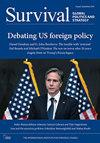The Wagner Revolt: Implications for Russia, Lessons for the West
IF 1.5
3区 社会学
Q2 INTERNATIONAL RELATIONS
引用次数: 0
Abstract
Abstract The Wagner Group’s revolt against Russian President Vladimir Putin’s regime, though contained, holds important implications for Russia and lessons for the West. The revolt was a full-scale crisis for the regime, reflected Putin’s extraordinary misreading of domestic realities, undermined his rule’s core rationale of bringing stability and security to Russia, exposed the brittleness of the Russian state, revealed weak support of Russian elites, demonstrated his need for mediation from a despised foreign leader, and brought to the surface the strains that the Russia–Ukraine war has imposed on the Russian polity. The two main takeaways for the West are that Putin chose compromise rather than escalation to deal with the crisis, and that over time the war is likely to impose deeper strains on Russia. It is now less clear than ever not only that Russia can win the war, but also that the regime that launched it will survive intact.瓦格纳起义:对俄罗斯的启示,对西方的教训
瓦格纳集团对俄罗斯总统弗拉基米尔·普京政权的反抗虽然受到遏制,但对俄罗斯和西方都有重要的启示。这场叛乱对该政权来说是一场全面危机,反映了普京对国内现实的严重误读,破坏了他为俄罗斯带来稳定和安全的统治核心理念,暴露了俄罗斯国家的脆弱,暴露了俄罗斯精英的薄弱支持,表明了他需要一个受人鄙视的外国领导人的调解,并将俄乌战争给俄罗斯政体带来的压力暴露出来。西方得到的两个主要结论是,普京选择妥协而不是升级危机来应对危机,随着时间的推移,战争可能会给俄罗斯带来更深的压力。现在比以往任何时候都更不清楚的是,不仅俄罗斯能赢得这场战争,而且发动这场战争的政权能否完好无损地生存下去。
本文章由计算机程序翻译,如有差异,请以英文原文为准。
求助全文
约1分钟内获得全文
求助全文
来源期刊

Survival
Multiple-
CiteScore
2.10
自引率
16.70%
发文量
88
期刊介绍:
Survival, the Institute"s bi-monthly journal, is a leading forum for analysis and debate of international and strategic affairs. With a diverse range of authors, thoughtful reviews and review essays, Survival is scholarly in depth while vivid, well-written and policy-relevant in approach. Shaped by its editors to be both timely and forward-thinking, the journal encourages writers to challenge conventional wisdom and bring fresh, often controversial, perspectives to bear on the strategic issues of the moment. Survival is essential reading for practitioners, analysts, teachers and followers of international affairs. Each issue also contains Book Reviews of the most important recent publications on international politics and security.
 求助内容:
求助内容: 应助结果提醒方式:
应助结果提醒方式:


